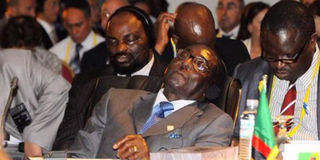Leaders should plan for life after presidency

Through Robert Mugabe’s 37-year rule, the telltale signs have been there showing that his rule turned despotic, unconstitutional and oppressive.
What you need to know:
- The issue: Life after presidency.
- Our view: Leadership does not start and end with being president; former presidents too have roles to play in helping their people.
Zimbabwe is in a crisis – one that many Africans will associate with. The army intervened this week and president Robert Mugabe’s rule seems poised to end. Zimbabwe, a country whose politics and economy has remained disturbed, did not just get into this crisis.
Through Robert Mugabe’s 37-year rule, the telltale signs have been there showing that his rule turned despotic, unconstitutional and oppressive.
The 93-year-old, the oldest head of government in the world, had turned the presidency into a life-long business. This is partly similar to many African countries where presidents manipulate their constitutions and cling on to power.
Former United States of America president Barack Obama, who at the beginning of this year handed over power to Donald Trump after completing his two terms, advised African leaders in 2015 to abide by term limits and their constitutions.
Africa has been synonymous with leaders who want to be presidents for life, and Mugabe is one of them. He, like other long-serving presidents currently in power, was not crude enough to declare himself president for life like Idi Amin did here in the 1970s. but all evidence pointed to his intention to never leave power.
African states should take smooth transfer of power as seen recently in the US, Ghana and Nigeria in 2015, as a lesson that their countries can move forward, sometimes even more speedily, after their exit.
Former presidents such as John Dramani Mahama of Ghana, South Africa’s Thabo Mbeki and Tanzania’s Jakaya Kikwete still have roles in their countries where they help their people. Leadership does not start and end with being president; former presidents too have roles to play in helping their people.
Former US president Jimmy Carter, for instance, through his foundation The Carter Centre, is improving lives, health, solving conflicts, enhancing freedom and democracy. Former South African president Thabo, Benjamin Mkapa formerly of Tanzania, etc, are applying themselves in different ways.
That Mr Mugabe chose to cling to power until now when he can hardly walk unaided, and in the process subjected himself and Zimbabweans to whatever they have been through, should be cause for reflection especially to leaders as the curtains begin to unceremoniously fall on his long presidency.




